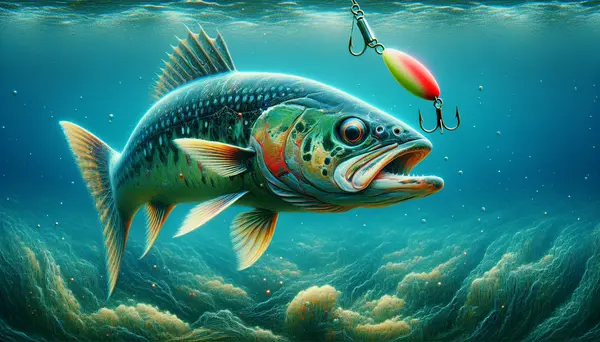Table of Contents:
Introduction to the Fascinating World of Fish Senses
Welcome, dear readers! Today we are diving deep into an exciting topic: The Science of Fish Senses and How Fish Detect Lures. This article will provide you with a comprehensive understanding of how fish use their senses in water. It's not just about throwing your line out there; it's also about knowing what happens beneath the surface. So whether you're a beginner or seasoned angler, this knowledge can significantly improve your fishing game!
Fish Vision: Seeing Beyond Human Capabilities
Fish have remarkable vision capabilities that allow them to detect lures effectively. Unlike humans who see three primary colors (red, green, blue), many species of fish perceive ultraviolet light as well - giving them an extra color dimension underwater. They can spot variations in brightness and contrast which makes colorful lures more attractive to them.
Pros and Cons of Using Lures Based on Fish Senses
| Pros | Cons |
|---|---|
| Fish are more likely to be attracted to lures that appeal to their senses. | Some fish may be frightened by overly aggressive lure presentations. |
| Using lures that simulate prey species can increase catch rates. | It requires a good understanding of the target species' behaviors and preferences. |
| There is a wide range of lure types and styles to suit different species and conditions. | Lures can be expensive, and there is a risk of losing them to snags or break-offs. |
Auditory Perception: Hearing Underwater Sounds
Besides excellent visual abilities, fish possess acute hearing skills too. Their lateral lines – sensory organs running along each side – enable them to pick up vibrations and pressure changes in the surrounding water caused by movement or noise from potential prey (or lure). Therefore using sound-emitting lures could be beneficial when trying to attract certain types of fish.
Olfactory Sense: Smelling Out Bait
You might wonder if smell plays any role under water? The answer is yes! Many fishes rely heavily on their olfactory sense for detecting food sources including baited hooks or artificial scents added onto lures. Some anglers even swear by adding specific smells like garlic oil or anise extract onto their baits believing these odors attract particular kinds of fish better than others.
Taste Sensitivity: The Final Verdict
Lastly, let's not forget about the sense of taste. Fish have taste buds all over their bodies, especially around their mouths and fins. This allows them to 'taste' potential food items before deciding whether it is worth eating or not.
The Art of Choosing the Right Lure
Understanding how fish detect lures through their senses can help you choose more effective bait for your fishing trips. For instance, if you're targeting a species known for its keen vision in clear waters, using brightly colored lures might be beneficial. On the other hand, if you're dealing with murky water conditions where visibility is low but sound travels well – consider using noise-making baits instead.
Fishing Techniques: Adapting to Fish Behavior
Beyond choosing suitable lure types based on fish sensory abilities - adapting your fishing techniques according to specific behaviors exhibited by different species could also increase your success rate significantly! Some fishes are attracted towards fast-moving objects while others prefer slower movements; some like shiny things whereas others get spooked easily by anything too flashy etcetera... It's all about observing and learning from each experience!
Conclusion: Understanding Leads To Success
In conclusion, understanding The Science of Fish Senses and How They Detect Lures, will undoubtedly enhance your angling skills regardless of whether you’re a novice or an experienced angler. By considering these factors when selecting lures and adjusting our tactics accordingly we stand a much better chance at successful catches every time we cast out line into water!
Essential Aspects of Fish Sensing: Understanding Lure Detection
How do fish detect lures?
Fish can detect lures using their highly developed sense of smell, sight, and lateral line that senses vibrations in the water.
What role does color play in lure detection?
Certain fish species are sensitive to specific colors, and this can influence their ability to detect a lure. Bright colors can be more effective in clear water conditions, while darker colors may be more noticeable in murky waters.
How do vibrations impact a fish's ability to detect a lure?
Fish sense vibrations in the water through their lateral line. Lures that emit vibrations can attract fish, especially in situations where visibility may be low.
Do fish have a sense of smell?
Yes, fish have a keen sense of smell. Some species can detect chemicals and pheromones in the water, which can lead them to lures.
How does the size of a lure affect a fish's ability to detect it?
The size of a lure can affect its visibility, wobble, and the amount of vibration it produces. Larger lures may attract larger fish, but they might also intimidate smaller ones. It's important to choose the correct lure size for the specific fish species targeted.







